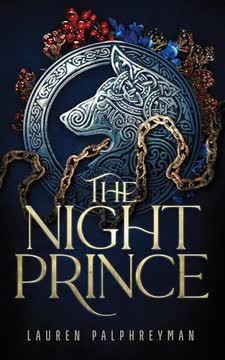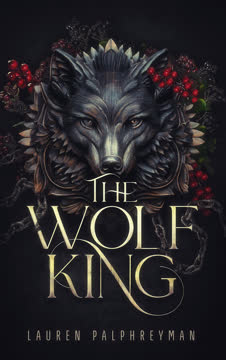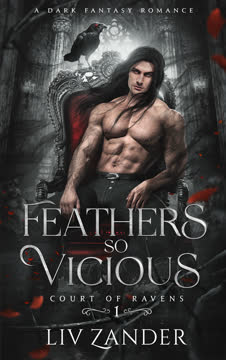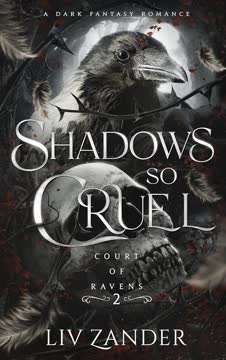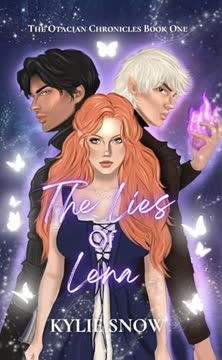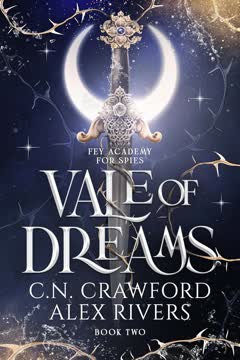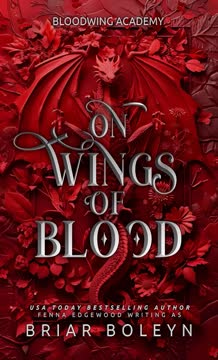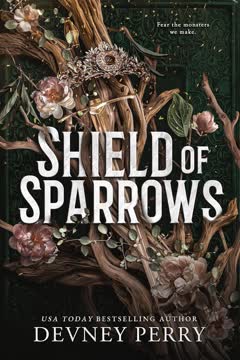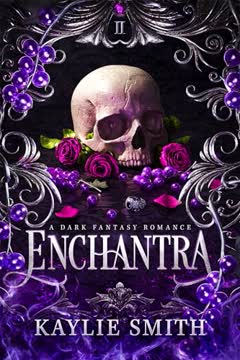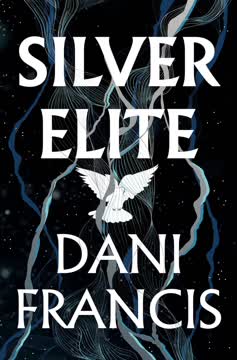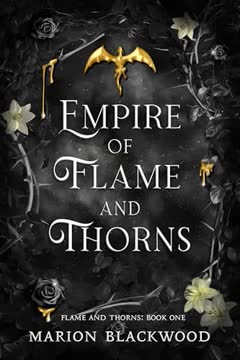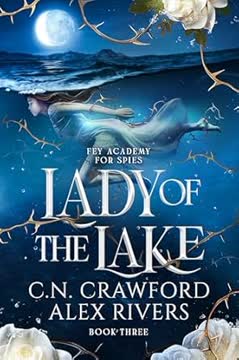Plot Summary
Prison Shadows and Dreams
The story opens in a dreamlike prison, where Blake and Aurora are drawn together by a mysterious, living bond. Blake, haunted by his past and the darkness within, finds Aurora in a cell, both of them stalked by shadowy forces. Their connection is visceral, fraught with loathing, longing, and a sense of inevitability. The dream blurs into reality, revealing that their lives are now intertwined by a magical bond—one that links their fates, emotions, and even pain. This bond, forged in violence and desperation, becomes the central thread of the narrative, shaping every choice and relationship that follows.
Wolves' Schemes Unveiled
Awakening from the fevered dream, Aurora finds herself in the Northlands, recovering from a wolf bite that nearly killed her. Callum, her lover and would-be king, tends to her, but the political machinations of the wolf clans swirl around them. Blake, the enigmatic alpha of Lowfell, has orchestrated events to bind Aurora's life to his, using her as a pawn in his quest for power. The wolves' world is governed by ancient laws, where bites, bonds, and bloodlines determine fate. As Aurora recovers, she learns of Blake's plot to seize the throne, and the dangerous web of loyalty, ambition, and desire that entangles them all.
The Bond's Dark Thread
Wolf law dictates that Aurora, bitten by the king, is now his property—unless another alpha claims her. The men around her debate her fate as if she were a prize, and Aurora's struggle for agency intensifies. The magical bond between her and Blake grows stronger, allowing them to sense each other's emotions and pain. Aurora is determined to break free, but the bond is both a curse and a lifeline, complicating her relationships with Callum and Blake. The tension between autonomy and belonging, love and power, becomes a central conflict as Aurora seeks to define herself in a world that would claim her as property.
Alpha Games and Alliances
As the Northlands prepares for war, alliances are forged and tested. Lochlan, a powerful alpha, is courted for his army, while James, the Wolf King, seeks to reclaim Aurora as his own. The wolves' society is a brutal hierarchy, where strength and cunning are prized. Aurora navigates the treacherous politics of the clans, forming uneasy friendships and rivalries. The looming threat of Alexander, a human lord with a vendetta, adds another layer of danger. Amidst feasts, rituals, and secret meetings, the true nature of power—who wields it, and at what cost—comes into sharp focus.
Rituals Under Eclipse
During the sacred ritual of Oidhche Fhada, the wolves gather under a blood moon to honor their goddess and mark the shifting of power. The ceremony is both beautiful and ominous, as old wounds and new ambitions come to the fore. James crashes the ritual, demanding Aurora's return, and Blake intervenes by claiming her with a bite, deepening the magical bond and igniting Callum's rage. The ritual exposes the fault lines in the wolves' society—between tradition and change, faith and ambition, love and violence. The eclipse becomes a metaphor for the darkness rising within and around them.
Law, Loyalty, and Betrayal
The aftermath of the ritual is explosive. Callum and Blake's alliance fractures as jealousy and betrayal boil over. Aurora, now marked by two alphas, becomes the focal point of their rivalry. The wolves' rigid laws are both shield and weapon, used to justify cruelty and control. Aurora's struggle for agency is mirrored by the men's struggle for dominance. The personal becomes political, and every choice is fraught with consequences. The tension between love and loyalty, law and freedom, drives the characters toward inevitable conflict.
Fever, Shifting, and Desire
Aurora's body and soul are in turmoil as the wolf bite triggers feverish transformations. Her desires become raw and feral, blurring the line between love and violence, pleasure and pain. Callum and Blake are both drawn to her, their rivalry charged with sexual and emotional tension. The fever dreams reveal hidden truths and traumas, as Aurora confronts her past and the darkness within. The shifting is not just physical, but symbolic—a metamorphosis of identity, power, and destiny. The bond with Blake becomes both a torment and a source of strength, as Aurora learns to harness her wildness.
The Night Prince's Mark
Blake's enigmatic past comes to light: he is not just an ambitious alpha, but a former prisoner of Night, the dark god who seeks to break free. Branded with Night's mark, Blake is both victim and agent of darkness, his soul pledged to a power beyond the mortal world. His connection to Aurora is deeper and more dangerous than anyone realizes. As Night's acolytes gather and ancient monsters stir, Blake's loyalty is tested. Is he a savior, a betrayer, or something in between? The revelation of his true nature raises the stakes for everyone.
Wolves, Kings, and Pawns
Aurora is kidnapped, traded, and tortured as the various factions vie for control. She is a pawn in the games of kings and alphas, her fate determined by the ambitions of men. Yet, even in captivity, she refuses to be broken. Her bond with Blake becomes a lifeline, and her memories of her mother—a wolf queen from the Snowlands—offer hope and guidance. The struggle for agency, dignity, and survival is at the heart of this chapter, as Aurora learns to fight not just for herself, but for the power she carries within.
The Heart of the Moon
The legend of the Heart of the Moon—a relic said to grant ultimate power to wolves—takes on new meaning. Aurora discovers that the Heart is not an object, but a bloodline: she is the living embodiment of the goddess's power, descended from the Elderwolf and Ghealach herself. Her mother's sacrifice, her own suffering, and the bond with Blake are all part of a larger destiny. The revelation transforms Aurora from pawn to queen, weapon to wielder. The power she feared is now hers to command, but it comes with a terrible price.
Night's Prisoners Awaken
Night's prison is breached, and his monstrous prisoners—serpents, soul-suckers, and worse—are unleashed upon the world. Alexander, revealed as a wolf and Night's acolyte, seeks to use Aurora to free his master. The battle in the Grey Keep is apocalyptic, as wolves and humans alike are slaughtered by the unleashed darkness. Aurora's power is the only hope, but using it means embracing the wildness and rage she has long suppressed. The line between savior and destroyer blurs, as the fate of kingdoms hangs in the balance.
Blood, Power, and Sacrifice
Tortured and on the brink of death, Aurora finally unleashes the full force of her power, destroying Night's monstrous serpent and saving the survivors. The cost is immense—blood, pain, and the shattering of old bonds. Blake is mortally wounded, and the magical bond between him and Aurora is tested to its limit. In a dreamlike sequence, Aurora must choose whether to break the bond and let Blake die, or save him and risk everything. Her choice is both an act of love and defiance, rewriting the rules of fate and power.
Truths Unleashed, Fates Entwined
In the aftermath, truths are revealed: Blake's soul belongs to Night, but his love for Aurora is real. Callum, heartbroken but honorable, lets Aurora go to pursue her destiny. Philip, Aurora's brother, is revealed as a wolf and a potential ally. The survivors regroup, forging new alliances and preparing for the greater war to come. Aurora, now fully awakened to her power and heritage, must decide what kind of queen she will be—and what price she is willing to pay for freedom, love, and vengeance.
The Goddess's Chosen Heir
Guided by visions of her mother and the goddess, Aurora embraces her role as the Heart of the Moon. She is no longer a pawn, but a queen in her own right, determined to unite the kingdoms and end the cycle of violence. The wolves, humans, and Night's acolytes all seek her, but she is no longer afraid. With Blake at her side—now her equal in power and pain—she sets out to claim her birthright, avenge her mother, and shape the fate of the world.
The Final Scream
The story ends with Aurora's final act of defiance: a scream that shatters the old order and heralds the birth of something new. The bond with Blake is unbreakable, but it is now a source of strength, not weakness. Callum, James, and the others must find their own paths in the world Aurora is remaking. The war with Night is far from over, but Aurora is no longer a victim or a pawn. She is the Heart of the Moon, the goddess's chosen heir, and the world will tremble at her power.
Characters
Aurora
Aurora is the daughter of the Southlands king and the last living heir to the goddess Ghealach's bloodline. Raised to be a pawn in her father's political games, she is marked by trauma, loss, and a fierce desire for autonomy. Her journey is one of transformation—from victim to survivor, pawn to queen, weapon to wielder. The magical bond with Blake both torments and empowers her, forcing her to confront her wildness, her desires, and her destiny. Aurora's greatest struggle is for agency: to define herself not by the men who would claim her, but by the power she carries within. Her arc is one of self-acceptance, courage, and the refusal to be broken.
Blake
Blake is the enigmatic alpha of Lowfell, a man marked by trauma, ambition, and a soul pledged to the God of Night. Once a victim of torture and death, he is resurrected as Night's agent, branded with the mark of the prison. His relationship with Aurora is fraught with loathing, longing, and a bond that neither can break. Blake is both savior and betrayer, manipulator and protector, friend and foe. His greatest fear is the darkness within, and his deepest desire is for freedom—from Night, from fate, from the pain that defines him. Blake's arc is a study in duality: light and shadow, love and hate, power and vulnerability.
Callum
Callum is the alpha of Highfell and the would-be Wolf King. He is defined by honor, loyalty, and a deep love for Aurora. His struggle is between duty and desire, law and freedom, tradition and change. The magical bond between Aurora and Blake is a source of agony for him, challenging his sense of self and his place in the world. Callum's arc is one of sacrifice: he must let go of the woman he loves to allow her to fulfill her destiny, even as it breaks his heart. He is both a leader and a man lost, searching for meaning in a world that is changing beyond recognition.
James
James is the former Wolf King, a man driven by pride, jealousy, and a desperate need for control. His relationship with Callum is fraught with rivalry and regret, and his treatment of Aurora is both cruel and calculated. James is a product of a brutal world, shaped by violence and the expectations of power. Yet, beneath his harsh exterior, there is a capacity for loyalty and even love—especially for his mate, Claire. James's arc is one of downfall and reluctant redemption, as he is forced to confront the consequences of his actions and the limits of his power.
Philip
Philip is Aurora's brother, the heir to the Southlands throne, and a secret wolf. Jealous, reckless, and often cruel, he is both a rival and an ally. His journey takes him from the palace to the Snowlands, where he discovers his true nature and forms unexpected alliances. Philip's arc is one of self-discovery and reluctant growth, as he is forced to confront his own weaknesses and the responsibilities of power. His relationship with Aurora is complex—marked by rivalry, resentment, and, ultimately, a fragile bond of family.
Elsie
Elsie is a woman marked by trauma and resilience. Abused by her father and branded with Night's mark, she is both victim and fighter. As Blake's half-sister, she offers insight into his past and the darkness that haunts him. Elsie's arc is one of survival and the search for belonging, as she navigates the dangers of the wolf world and the scars of her past.
Arran
Arran is a former soldier, a half-wolf, and one of Blake's closest allies. Marked by loss, addiction, and a fierce loyalty to those he loves, Arran is both protector and avenger. His relationship with Elsie and Alfie reveals a softer side, while his role in the final battle showcases his strength and courage. Arran's arc is one of redemption and the search for peace in a world at war.
Jack
Jack is a Southlands-born wolf, a former prisoner, and Blake's most trusted confidant. Witty, resourceful, and fiercely loyal, Jack is both comic relief and a voice of reason. His past is intertwined with Blake's, and his actions are driven by a desire to protect his found family. Jack's arc is one of survival and the forging of new bonds in the aftermath of trauma.
Claire
Claire is a rare female alpha, James's mate, and a leader in her own right. Strong, independent, and unafraid to challenge the men around her, Claire is both ally and rival. Her relationship with James is tumultuous, marked by passion and conflict. Claire's arc is one of self-determination and the refusal to be defined by others.
Alexander
Alexander is a human lord with a vendetta against Aurora and a soul pledged to Night. Charismatic, ruthless, and fanatical, he is both a rival and a mirror to Blake. Alexander's actions drive much of the conflict, as he seeks to use Aurora to free his master and unleash darkness upon the world. His arc is one of ambition, fanaticism, and ultimate downfall.
Plot Devices
The Magical Bond (Anam-Cridech)
The central plot device is the magical bond between Aurora and Blake, forged in violence and desperation. This bond allows them to sense each other's emotions, pain, and even thoughts. It is both a curse and a lifeline, complicating every relationship and choice. The bond is revealed to be the Anam-Cridech, a rare and unbreakable connection created by the goddess Ghealach. It is both a metaphor for trauma and a literal force that shapes destiny. The bond's true nature is foreshadowed through dreams, fever, and the reactions of those around them, culminating in the revelation that it can only be broken by the power of the moon—or by a choice to let go.
Dream Sequences and Shared Memories
Dreams, fever visions, and shared memories are used throughout the narrative to reveal hidden truths, foreshadow future events, and deepen the psychological complexity of the characters. These sequences allow for the exploration of trauma, desire, and destiny, as well as the unveiling of secrets that drive the plot. The use of dreams as a narrative device blurs the line between reality and the subconscious, heightening the sense of inevitability and fate.
Wolf Law and Ritual
The rigid laws and rituals of wolf society are used to justify control, violence, and betrayal. Bites, bonds, and bloodlines determine fate, and the characters are constantly navigating the tension between tradition and change. Rituals like Oidhche Fhada serve as both moments of beauty and catalysts for conflict, exposing the fault lines in the society and the personal struggles of the characters.
Foreshadowing and Symbolism
Symbols like the key with crescent moons, the Heart of the Moon, and Night's mark recur throughout the story, foreshadowing the revelations to come. The use of family trees, scars, and brands serves as both literal and metaphorical markers of identity, power, and trauma. The interplay of light and shadow, moon and night, is woven into the narrative structure, reinforcing the themes of duality and transformation.
Power, Agency, and Sacrifice
The narrative is structured around the struggle for agency—personal, political, and magical. Every character is forced to confront the cost of freedom, love, and power. Sacrifice is a recurring motif, from Aurora's mother's death to Blake's bargain with Night, to Aurora's final act of unleashing her power. The story is a meditation on what it means to choose, to fight, and to refuse to be broken.
Analysis
The Night Prince is a dark, romantic fantasy that interrogates the nature of power, trauma, and agency through the lens of werewolf mythology and gothic romance. At its core, the novel is about the struggle to define oneself in a world that would claim, use, and break you. Aurora's journey—from pawn to queen, victim to wielder, object to subject—is a powerful meditation on autonomy, resilience, and the refusal to be defined by others' desires. The magical bond between Aurora and Blake is both a metaphor for trauma and a literal force that shapes destiny, complicating the boundaries between love and violence, freedom and fate. The novel's use of dreams, rituals, and ancient laws creates a rich psychological tapestry, where every choice is fraught with consequence and every relationship is a battleground. In a world where gods, monsters, and men vie for control, The Night Prince asks what it means to be free—and whether true freedom is ever possible. The ultimate lesson is one of self-acceptance, courage, and the power of unleashing one's true self, even in the face of darkness.
Last updated:
FAQ
Synopsis & Basic Details
What is The Night Prince about?
- A Princess's Perilous Journey: The Night Prince follows Princess Aurora, a Southlands royal, as she navigates the treacherous world of the Northlands after being bitten by the Wolf King, James. Her life becomes inextricably linked to Blake, the enigmatic alpha of Lowfell, through a mysterious magical bond, forcing her into a complex web of alliances, betrayals, and self-discovery.
- Struggle for Autonomy: At its core, the novel explores Aurora's fierce fight for agency against those who would claim her as property or a pawn in their power games, including her father, James, and even Blake. Her journey is a quest to define herself beyond the roles imposed upon her, culminating in the revelation of her true, ancient power.
- Unveiling Dark Secrets: The narrative delves into the hidden histories of its characters and the Northlands, revealing Blake's past as a prisoner of the dark god Night, the true nature of the magical bond (Anam-Cridech), and the shocking truth of Aurora's heritage as the living "Heart of the Moon," a power sought by both allies and enemies.
Why should I read The Night Prince?
- Intricate Character Dynamics: Readers will be captivated by the complex, morally ambiguous relationships, particularly the intense, fraught connection between Aurora and Blake, and the emotional turmoil experienced by Callum. The novel excels at exploring the psychological depths of its characters, revealing their hidden motivations and vulnerabilities.
- Rich World-Building & Lore: Beyond the political intrigue, the book expands on the unique werewolf mythology, introducing ancient gods, sacred rituals, and a detailed history of conflict between humans and wolves. The Northlands itself becomes a character, with its wild landscapes mirroring the untamed nature of its inhabitants.
- Themes of Power & Identity: The Night Prince offers a compelling exploration of agency, trauma, and transformation. Aurora's journey from a seemingly helpless princess to a powerful, self-possessed queen challenges traditional fantasy tropes, making it a resonant read for those who appreciate strong female leads and stories of profound personal growth.
What is the background of The Night Prince?
- Ancient Wolf Lore & Mythology: The story is steeped in the Northlands' rich mythological background, centered on the Moon Goddess Ghealach and the dark God of Night, Oidhche. This includes the Elderwolf origin story, the Moon Goddess's imprisonment, and the existence of Night's acolytes and monstrous prisoners, setting the stage for a looming, ancient conflict.
- Political & Inter-Kingdom Strife: The narrative unfolds against a backdrop of ongoing war between the human Southlands and the wolf-inhabited Northlands. Internal wolf politics, including clan rivalries and challenges for the Wolf Throne, further complicate the landscape, with characters like James and Callum vying for power and influence.
- Trauma and Societal Norms: The world of The Night Prince is shaped by brutal societal norms, particularly wolf law regarding "claimed" individuals and the Southlands' oppressive religious practices (e.g., the High Priest's beatings). This background highlights the pervasive impact of trauma and the characters' struggles to break free from cycles of abuse and control.
What are the most memorable quotes in The Night Prince?
- "You're not a weapon. You're a fucking tornado.": This powerful quote from Blake to Aurora (Chapter 62) encapsulates her transformation from a perceived object of war into a force of nature. It highlights her burgeoning power and agency, shifting the narrative from her being a pawn to a formidable, uncontrollable entity.
- "Ghealach did not rip out her heart so the Elderwolf could be close to her power. She sent him her daughter, so that he would protect her. The power the Wolves seek. . . it was never a rock, or a relic, or a tool to be used. It was a person, and then a bloodline. We are descended from Ghealach and the Elderwolf, little one. You are the Heart of the Moon.": Aurora's mother's revelation (Chapter 60) is the pivotal moment defining Aurora's true identity and the central mystery of the series. It recontextualizes the entire mythology, making Aurora the literal embodiment of the Moon Goddess's power, not just a wolf.
- "I will consume you until there is nothing left of you. I will ruin you. I will coil myself so tightly around you that you will beg me to release you, and still then, I will not let you go.": Aurora's furious declaration to Blake (Chapter 46) showcases her unleashed rage and newfound ferocity. It marks a significant turning point in her character arc, demonstrating her refusal to be manipulated and her willingness to fight back with a primal intensity that mirrors Blake's own darkness.
What writing style, narrative choices, and literary techniques does Lauren Palphreyman use?
- Visceral First-Person Perspective: Palphreyman employs a close first-person perspective, primarily through Aurora's eyes, immersing the reader directly in her emotional and sensory experiences. This allows for a raw, unfiltered portrayal of her trauma, fear, desire, and burgeoning power, making her internal struggles deeply personal and immediate.
- Symbolic Dream Sequences & Foreshadowing: The novel frequently uses vivid dream sequences and fever visions that blur the line between reality and the subconscious. These are not merely plot devices but serve as powerful literary tools for foreshadowing future events, revealing hidden memories, and exploring the characters' psychological states, often laden with symbolic imagery (e.g., Night's prison, the marionette).
- Sensory-Rich & Evocative Language: Palphreyman's prose is highly sensory, utilizing detailed descriptions of scents ("pine and parchment," "blood and dark fairytales"), sounds ("howls permeate the castle walls," "scrape of metal scalpels"), and physical sensations ("ice pumps through my veins," "skin prickles"). This creates an immersive atmosphere, enhancing the gothic and fantastical elements of the narrative.
Hidden Details & Subtle Connections
What are some minor details that add significant meaning?
- Blake's Fear of Storms: A seemingly minor detail, Blake's aversion to storms (Chapter 27) is later revealed to be a profound psychological scar from his childhood torture in a well during a storm (Chapter 37). This detail humanizes him, linking his vulnerability to his traumatic past and explaining his need for control.
- The Lobster Metaphor: Aurora's anecdote about lobsters being slowly boiled alive (Chapter 22) serves as a powerful, subtle metaphor for her own entrapment and gradual realization of her perilous situation. Elsie's subsequent decision to "free the lobsters" directly mirrors Aurora's burgeoning agency and desire for liberation.
- Philip's Missing Finger: Philip's missing fingertip (Chapter 41), initially a curious detail, is later revealed to be frostbite from his journey to the Snowlands, hinting at his own hidden wolf nature and the hardships he endured in his quest for answers, contrasting with his spoiled princely facade.
What are some subtle foreshadowing and callbacks?
- Blake's "Experiments" Books: Early mentions of Blake's medical tomes, filled with gruesome experiments on wolves (Chapter 13), subtly foreshadow the later revelation that these were records of his own torture by the Maester of Healing (Chapter 44). This recontextualizes his character from a sadist to a victim.
- Recurring Night's Mark Symbol: The key with two crescent moons, first seen in Blake's dream prison (Prologue) and later in Night's chapel (Chapter 6), consistently foreshadows the pervasive influence of the God of Night and the true nature of Blake's connection to him as a branded prisoner.
- Callum's "Oral Fixation": Callum's explanation of wolves' "oral fixation" and tendency to bite (Chapter 16) subtly foreshadows Aurora's own primal urges to bite when overwhelmed by emotion, particularly her anger and jealousy, hinting at her latent wolf-like power before her true nature is revealed.
What are some unexpected character connections?
- Blake and Philip's Shared Captivity: It's revealed that Blake and Philip knew each other from their time imprisoned in the Southlands palace dungeons (Chapter 45), where Blake was tortured and Philip was bitten by Jack. This unexpected connection highlights the pervasive reach of the Southlands' cruelty and the shared trauma that binds seemingly disparate characters.
- Mrs. McDonald's Past with Blake: The formidable cook, Mrs. McDonald, is revealed to be from Lowfell and surprisingly familiar with Blake, even wiping blood from his face (Chapter 32). This hints at a deeper, more complex history between them, suggesting Blake's past actions at Lowfell were not universally condemned and that he might have offered refuge to some of Bruce's former clan.
- Alexander's Wolf Nature & Shared Torturer: Alexander, initially presented as a human lord, is revealed to be a wolf and a former prisoner of the Maester of Healing, just like Blake (Chapter 55). This unexpected parallel creates a dark mirror between the antagonist and one of the protagonists, showing how shared trauma can lead to vastly different paths.
Who are the most significant supporting characters?
- Elsie, Blake's Half-Sister: Elsie provides crucial insight into Blake's past and motivations, revealing his act of saving her from their abusive father (Chapter 12). Her own trauma and resilience, marked by Night's symbol, parallel Aurora's journey and highlight the pervasive impact of patriarchal control and religious fanaticism.
- Jack, Blake's Confidant: Jack serves as Blake's loyal right-hand man, offering both comic relief and a grounded perspective on Blake's often-unfathomable actions. His past as a prisoner in the Southlands and the wolf who bit Philip (Chapter 44) deepens his connection to Blake and the overarching conflict, making him a key player in Blake's schemes.
- Philip, Aurora's Brother: Philip's transformation from a spoiled prince to a complex, secretly wolf-bitten individual (Chapter 39) makes him a surprisingly significant character. His journey to the Snowlands and his alliance with Ingrid introduce a new, critical threat (Night's acolytes) and offer a potential path for uniting the wolf kingdoms, directly influencing Aurora's future.
Psychological, Emotional, & Relational Analysis
What are some unspoken motivations of the characters?
- Blake's Quest for Freedom: Beyond his stated ambition for the Wolf Throne, Blake's deepest, unspoken motivation is freedom from Night's eternal torment (Chapter 63). His actions, including seeking the Heart of the Moon and manipulating others, are driven by a desperate desire to escape his fate as Night's prisoner, making him a more sympathetic, albeit still dangerous, figure.
- Callum's Fear of His Father's Legacy: Callum's overprotective nature and struggle with his wolf instincts are subtly motivated by a deep-seated fear of becoming like his abusive father (Chapter 19). He suppresses his more primal urges, including his jealousy and possessiveness, to avoid repeating the cycle of cruelty he witnessed, which sometimes leads to miscommunication with Aurora.
- Aurora's Desire for Unconditional Acceptance: Beneath her fight for agency, Aurora implicitly yearns for unconditional acceptance, particularly after a lifetime of being judged and controlled by her father and the High Priest. Her vulnerability with Blake, despite his manipulations, stems from his ability to see and acknowledge her "wildness" without judgment, a stark contrast to Callum's protective gentleness.
What psychological complexities do the characters exhibit?
- Blake's Duality and Self-Loathing: Blake is a master of masks, projecting nonchalance and amusement while harboring deep-seated trauma and self-loathing from his torture and his soul belonging to Night (Chapter 37). His internal conflict between his forced servitude to Night and his growing connection to Aurora creates a complex psychological landscape, where his actions are driven by a mix of self-preservation and unexpected compassion.
- Callum's Internalized Conflict: Callum grapples with the inherent "wildness" of his wolf nature versus his desire to be an honorable, gentle leader, a conflict exacerbated by his father's abusive legacy (Chapter 19). His psychological complexity lies in his struggle to reconcile these opposing forces, leading to moments of intense jealousy and possessiveness that he actively tries to suppress, often to his own detriment.
- Aurora's Trauma and Identity Fragmentation: Aurora's psychological complexity stems from years of abuse and suppression, leading to a fragmented sense of self. Her fever dreams and visions (Chapter 2) are literal manifestations of her trauma, and her struggle to "unleash" her power is also a journey of integrating her repressed emotions and accepting her true identity as the Heart of the Moon, rather than the "sinner" she was taught to be.
What are the major emotional turning points?
- Blake's Bite at Oidhche Fhada: Blake's public claiming of Aurora with a bite (Chapter 9) is a major emotional turning point, not just for Aurora's physical safety but for the emotional dynamics between the three leads. It ignites Callum's furious jealousy and forces Aurora to confront her lack of autonomy, deepening the bond and setting off a chain reaction of emotional turmoil.
- Aurora's Confrontation with Callum about the Kiss: The heated argument between Aurora and Callum after Blake's forced kiss (Chapter 48) is a critical emotional turning point. It forces Callum to articulate his deep-seated jealousy and fear of losing Aurora, while Aurora confronts his perceived betrayal and the unfairness of his judgment, pushing their relationship to a breaking point.
- Aurora's Unleashing of Power: Aurora's decision to "unleash" her power in the amphitheater (Chapter 60) is the ultimate emotional turning point. It represents her complete acceptance of her identity as the Heart of the Moon and her refusal to be a victim any longer. This act is a cathartic release of years of suppressed rage and fear, transforming her into a formidable force.
How do relationship dynamics evolve?
- Aurora & Callum: From Protector to Partner (and back again): Their relationship evolves from Callum as Aurora's rescuer and protector to a more intimate, passionate partnership. However, Callum's deep-seated need to protect and his struggle with jealousy, particularly regarding Blake, create recurring friction, leading to moments where Aurora feels stifled and unacknowledged as an equal, culminating in their temporary separation.
- Aurora & Blake: From Antagonism to Unbreakable Bond: Their dynamic shifts dramatically from initial loathing and manipulation to a complex, undeniable connection. Blake's initial use of Aurora as a pawn gradually gives way to genuine concern and a shared understanding of trauma, culminating in the revelation of their mate bond (Anam-Cridech). This evolution is fraught with tension, as Aurora struggles to reconcile his past deceptions with his protective actions.
- Callum & James: Brotherly Rivalry to Mortal Enemies: The long-standing rivalry between Callum and James escalates from political maneuvering to a full-blown war for the throne. Their relationship is marked by a complex mix of past affection and present animosity, with James's cruelty and Callum's honor constantly clashing. The conflict over Aurora and the throne ultimately solidifies their roles as mortal enemies, despite their shared blood.
Interpretation & Debate
Which parts of the story remain ambiguous or open-ended?
- The Full Extent of Night's Influence: While Blake is revealed to be Night's prisoner and the Night Prince, the full scope of Night's power and his ultimate plan for the world remains ambiguous. The "Dark Beast" is unleashed, but the true nature of Night's army and the scale of the impending war are left open-ended, setting up future conflict.
- The Future of the Anam-Cridech: Despite Aurora's belief that she can break the bond with the Heart of the Moon's power, Mrs. McDonald states it's "unbreakable" once accepted (Chapter 49). The ending leaves the bond intact, with Blake and Aurora still connected, raising questions about whether it truly can be severed or if they are destined to remain bound, regardless of their desires.
- The Fate of the Kingdoms: The novel concludes with Aurora embracing her power and setting out to claim her birthright as queen of the Southlands, with Blake at her side. However, the political landscape remains volatile, with James still alive, Alexander's army defeated but not fully dispersed, and the looming threat of Night's acolytes. The path to uniting the kingdoms and achieving lasting peace is left uncertain.
What are some debatable, controversial scenes or moments in The Night Prince?
- Callum's Command to Kiss Blake: Callum's decision to order Blake to kiss Aurora (Chapter 29), despite his own jealousy and Aurora's distress, is highly debatable. While he claims it was to free her, it can be interpreted as a moment where Callum prioritizes strategy over Aurora's autonomy and emotional well-being, mirroring the very control she despises.
- Blake's Initial Manipulation of Aurora: Blake's calculated actions to link his life to Aurora's and use her as a pawn in his quest for the throne (Chapter 2) are controversial. His later claims of saving her life and his genuine feelings for her force readers to debate whether his initial deceit can be forgiven or if his manipulative nature is an inherent flaw.
- Aurora's Acceptance of Blake's "Friendship": Aurora's eventual admission that Blake is her "friend" (Chapter 62), despite his repeated deceptions, torture, and plotting against Callum, can be controversial. It challenges traditional notions of trust and loyalty, prompting readers to question the nature of their bond and whether her feelings are a result of Stockholm Syndrome or a deeper, more complex connection forged in shared trauma.
The Night Prince Ending Explained: How It Ends & What It Means
- Aurora's Power Unleashed: The climax sees Aurora fully embracing her identity as the "Heart of the Moon" (Chapter 60), a living embodiment of Ghealach's power. She unleashes a devastating scream that destroys Night's serpentine prisoner, demonstrating her immense, previously suppressed abilities. This signifies her complete transformation from a victim to a powerful, self-actualized queen, no longer defined by others' control.
- Blake's True Nature & Unbreakable Bond: Blake is revealed to be Night's prisoner, his soul belonging to the dark god, and he was branded as such (Chapter 64). He confesses he didn't create the Anam-Cridech bond but activated it to save Aurora, and it cannot be broken. When Alexander mortally wounds Blake, Aurora chooses not to break the bond, instead pulling him from Night's prison in a shared dream, saving his life and solidifying their unbreakable connection. This means their fates are permanently intertwined, for better or worse.
- A New Path Forward: The ending sets up a new trajectory for Aurora. She decides to claim her father's throne as queen of the Southlands, with Blake, now her mate and equal in power, at her side. Callum, though heartbroken by the bond, accepts Aurora's decision and promises to wait for her. The immediate threat of Alexander is neutralized, but the larger war against Night and his acolytes looms, with Aurora and Blake positioned as central figures in the coming conflict, ready to face it together.
Review Summary
The Night Prince receives mostly positive reviews, with readers praising the character development, world-building, and romantic tension. Many appreciate the complexity of the love triangle and the growth of the main character, Aurora. Some criticize pacing issues and find Aurora's decision-making frustrating. The book's ending leaves readers eagerly anticipating the third installment. While opinions on the male leads vary, Blake emerges as a fan favorite. Overall, reviewers find the book an engaging and emotionally charged continuation of the series.
Wolf King Series
Similar Books
Download PDF
Download EPUB
.epub digital book format is ideal for reading ebooks on phones, tablets, and e-readers.
